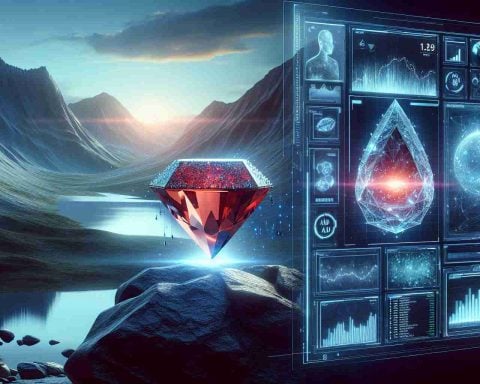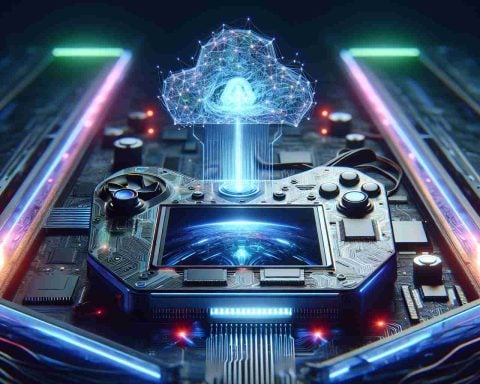In a bold move for the tech industry, Nvidia is set to revolutionize the robotics world in 2025. The chipmaking behemoth plans to introduce a groundbreaking series of compact computers designed specifically for humanoid robots, dubbed Jetson Thor, in early 2025, according to recent reports.
This strategic shift is part of Nvidia’s long-term vision, building on innovations showcased by CEO Jensen Huang at Nvidia’s annual conference this past March. At the event, the company demonstrated an array of advanced robots, all benefiting from Nvidia’s cutting-edge chip technology. Rather than entering head-to-head competition with manufacturing giants such as Tesla, Nvidia aims to empower the global robotics industry by supplying its core technology. This approach, as explained by Nvidia’s Vice President of Robotics, Deepu Talla, underscores the company’s mission to bolster “hundreds of thousands” of robot manufacturers worldwide.
The timing of this initiative is driven by two vital technological advancements: the rapid development of generative AI models and the ability to train robots using simulated environments. These breakthroughs have paved the way for more sophisticated and autonomous robotic systems.
Interestingly, Nvidia’s expansion into AI-enhanced robotics coincides with tech giants like Amazon and Google working to reduce reliance on Nvidia’s AI chips by creating their proprietary technology. While Nvidia remains tight-lipped on this aspect, it’s clear that the landscape of robotics and AI is on the brink of a significant evolution, with Nvidia at its forefront.
Nvidia’s Jetson Thor: Revolutionizing Robotics by 2025
In an exciting development for the tech and robotics industry, Nvidia is gearing up to introduce the groundbreaking Jetson Thor series, marking a seismic shift in how humanoid robots will function in the near future. Set to debut in early 2025, this series of compact computers promises to revolutionize robotic capabilities with cutting-edge technology specifically designed for humanoid applications.
Innovations and Features of Jetson Thor
Nvidia’s Jetson Thor is expected to integrate advanced AI algorithms, allowing humanoid robots to perform more sophisticated tasks autonomously. The series focuses on high-performance computing packed into a compact form, enabling advanced neural networks and real-time data processing skills. This innovative approach will empower robots with enhanced decision-making abilities and adaptive learning capabilities in diverse environments.
Strategic Vision and Industry Impact
Nvidia’s strategic decision to focus on robotics rather than direct competition with manufacturing giants like Tesla highlights their role as an enabler of global innovation. By providing core technology to “hundreds of thousands” of robot manufacturers worldwide, Nvidia aims to amplify productivity and innovation across the entire robotics sector.
As tech giants like Amazon and Google work to develop proprietary AI chip technologies, Nvidia’s continual advancements reinforce its pivotal position in the robotics and AI landscape. The Jetson Thor series aligns with Nvidia’s broader vision by leveraging breakthrough technologies—generative AI models and sophisticated simulated training environments—to shape future technologies.
Market Predictions and Trends
The introduction of Nvidia’s Jetson Thor is a potential catalyst for increased market growth in the robotics sector. Analysts predict a surge in demand for advanced robotics capable of handling complex real-world scenarios in industries ranging from healthcare and logistics to manufacturing and service sectors.
In addition, these advancements could inspire new use cases and expand the application of humanoid robots beyond traditional boundaries. This progress aligns with current trends towards more personalized and adaptable technology solutions across various industrial and commercial domains.
Security and Sustainability Aspects
With an increased emphasis on AI-enhanced capabilities, security becomes crucial. Nvidia is expected to implement robust security measures within Jetson Thor to protect against vulnerabilities inherent in AI systems. Additionally, Nvidia’s commitment to sustainability may see the integration of energy-efficient designs that minimize the environmental impact of these technologies.
Future Outlook
Nvidia’s Jetson Thor is poised to not only elevate robotic performance but also reshape industry dynamics by offering superior technologies that encourage widespread adoption and innovation. By 2025, the tech community is likely to witness significant milestones in robotic autonomy and intelligence, with Nvidia playing a central role.
For more information on Nvidia’s advancements in AI and robotics, visit the official Nvidia website.


















